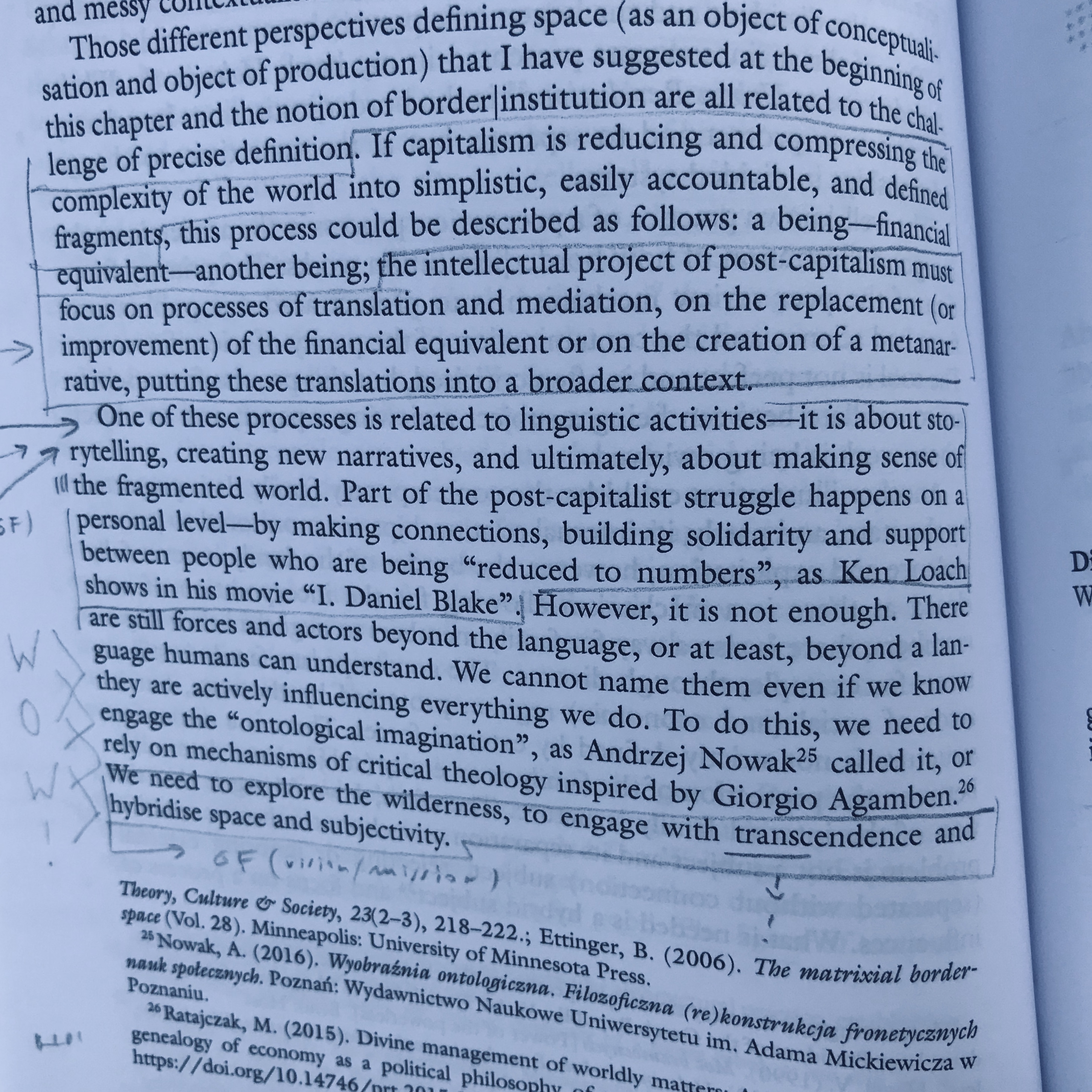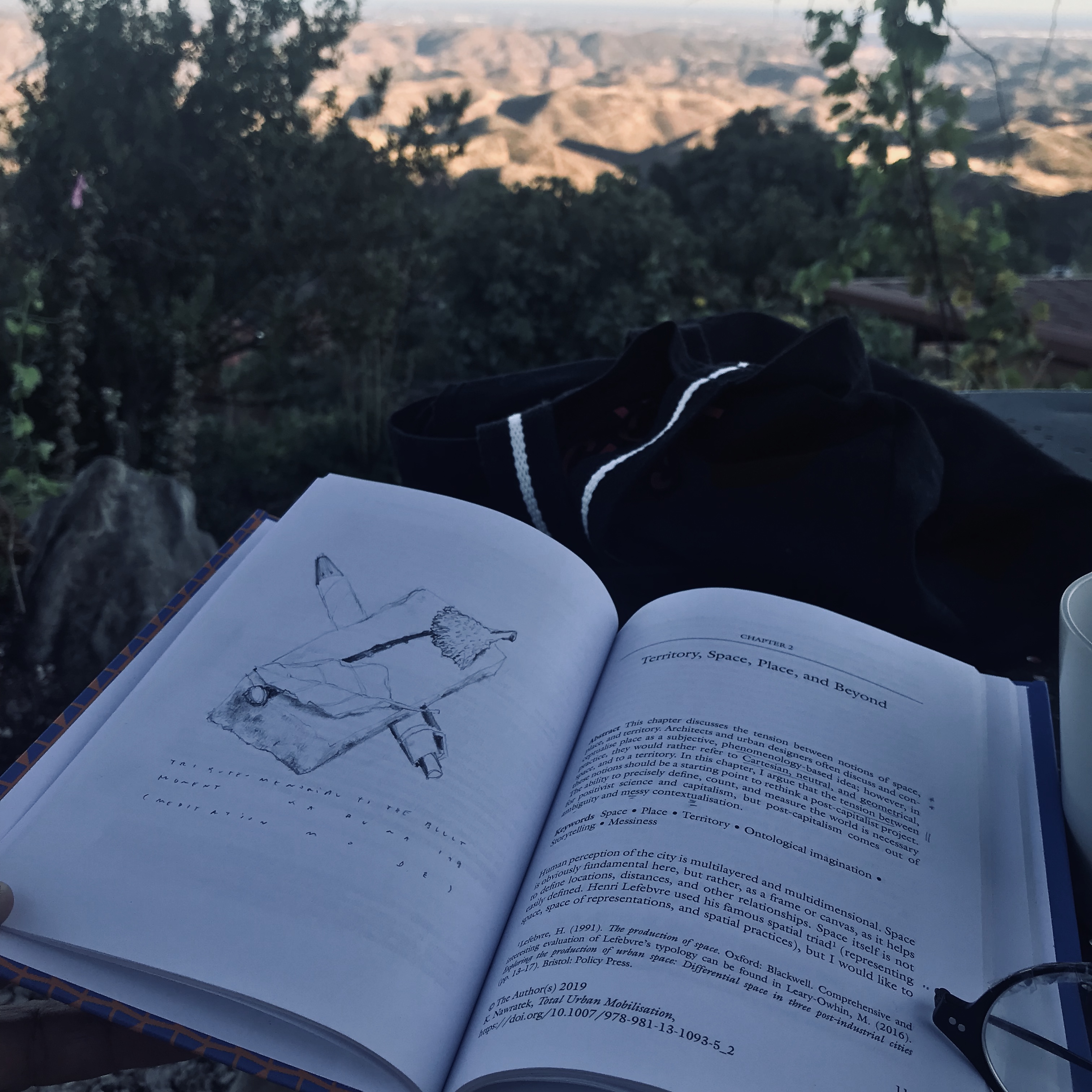Reading (and wildly annotating!) Krzysztof Nawratek’s latest book – Total Urban Mobilisation: Ernst Jünger and the Post-Capitalist City –, an exhilarating read in mere 98 pages. The place: the warmhearted harbour for searching minds which is Karuna, the retreat center in the never-ending hills of Monchique, where the pressing desire for a post-capitalist urban life would apparently seem out of place.
In the homecoming process of merging with the self, my conviction is nevertheless that any method is welcome, and any path shall be open to fascinating detours – including the literally religious effort of interiorizing such a densely woven (there you go, post-secular) socio-cultural horizon, written with the boldness of a spiritual anarchist.
Themes such as social co-existence, citizen agency, urban creativity, tactical urbanism or experimental prototyping – to name just a few – are firmly, but also delicately interconnected by means of Ernst Jünger’s stereoscopic wanderings, in a tribute to truths capitalism and the neoliberal Dark Enlightenment gurus insist to ignore. Not that I suffer with the current monstrous misleading of lives and nature, for compassion and awareness is in any case more powerful than ignorance and negation.
But anyway, between a fresh take on case studies emerging all around the globe and sharply provocative philosophical positions articulated with utmost concision, the text is a discursive experiment on the foundations of common life on Earth and at the same time an enjoyable and almost dramaturgic sequence of landscapes for insightful thought to engage with the Self right within the urban condition. In such meta-narrative, places like Karuna are certainly gateways – portals – to the silent city where all ideas come to rest and become the sediment for Good.
This little book establishes a bridge with the heavier (considering the number of pages) and more poetic and literary Foams by Peter Sloterdijk. Which is relevant, since we’re all in need of alternatives for exhausted ideologies and soulless urban practices. Total urban mobilisation is just the right notion where to start. Just take some time for the search to take you to the brave new horizon of the post-capitalist city, by the hand of one of the most post-critical theorists of today.
And now, back to some meditation, possibly the next revolution in social interaction we’re all truly in need of.
Karuna, this Summer. Thank you.
Lendo (e anotando violentamente!) o último livro de Krzysztof Nawratek – Total Urban Mobilisation: Ernst Jünger and the Post-Capitalist City – uma leitura enpolgante de meras 98 páginas. O lugar: o caloroso porto para almas em busca que é o centro de retiros Karuna, nos infindáveis montes de Monchique, onde o desejo premente por uma vida urbana pós-capitalista poderia parecer fora de contexto.
No processo de regresso a uma fusão com o Self, a minha convicção é de que qualquer método não deixa de ser bem-vindo; por outro lado, qualquer caminho deve estar aberto a fascinantes desvios – incluindo o esforço literalmente religioso de interiorizar tão densamente tecido horizonte sociocultural. Lá está: pós-secular.
Temas como a co-existência social, o agenciamento cidadão, criatividade urbana, urbanismo táctico ou prototipagem experimental – para citar apenas alguns – são delicada- mas também firmemente interconectados por meio de um rememorar dos passeios estereoscópicos de Ernst Jünger, num tributo a verdades que o capitalismo e os gurus neoliberais do Dark Enlightenment teimam em ignorar. Não que eu sofra com o monstruoso engano de vidas e natureza que por aí medra, já que a compaixão e a consciência [awareness] são em qualquer dos casos mais poderosos que a ignorância e a negação.
Seja como for, entre abordagens revigorantes de casos de estudo que emergem em todo o globo e posições filosóficas cortantemente provocatórias, articuladas com enorme precisão, o texto é um experimento discursivo sobre os fundamentos da vida em comum na Terra e ao mesmo tempo uma sequência agradável e quase dramatúrgica de paisagens onde o pensamento do discernimento pode engajar-se no Self, bem no seio da condição urbana. Nesta meta-narrativa, lugares como Karuna são certamente entradas – portais – para a cidade silenciosa onde todas as ideias vêm repousar e tornar-se no sedimento do Bem.
Este pequeno livro estabelece uma ponte com o mais pesado (em termos do número de páginas) e mais poético e literário Foams de Peter Sloterdijk. O que é assaz relevante, uma vez que estamos bem precisados de alternativas para exaustas ideologias e desalmadas práticas urbanas. A mobilização urbana total é exactamente a noção certa por onde começar. Basta tirar-se algum tempo para que a busca nos leve ao belo novo horizonte da cidade pós-capitalista, pelas mãos de um dos teóricos mais pós-críticos dos dias de hoje.
E agora, de regresso à meditação, possivelmente a próxima revolução na interacção social de que todos realmente estamos precisados.
Karuna, este Verão. Obrigado.



Pingback: UrbanAphorisms